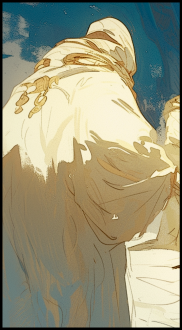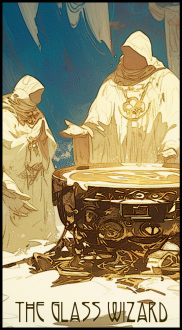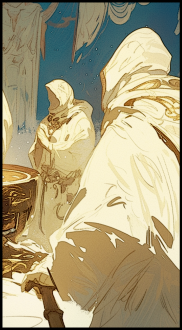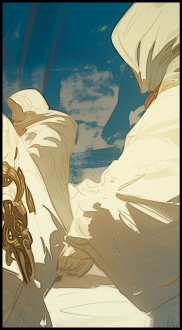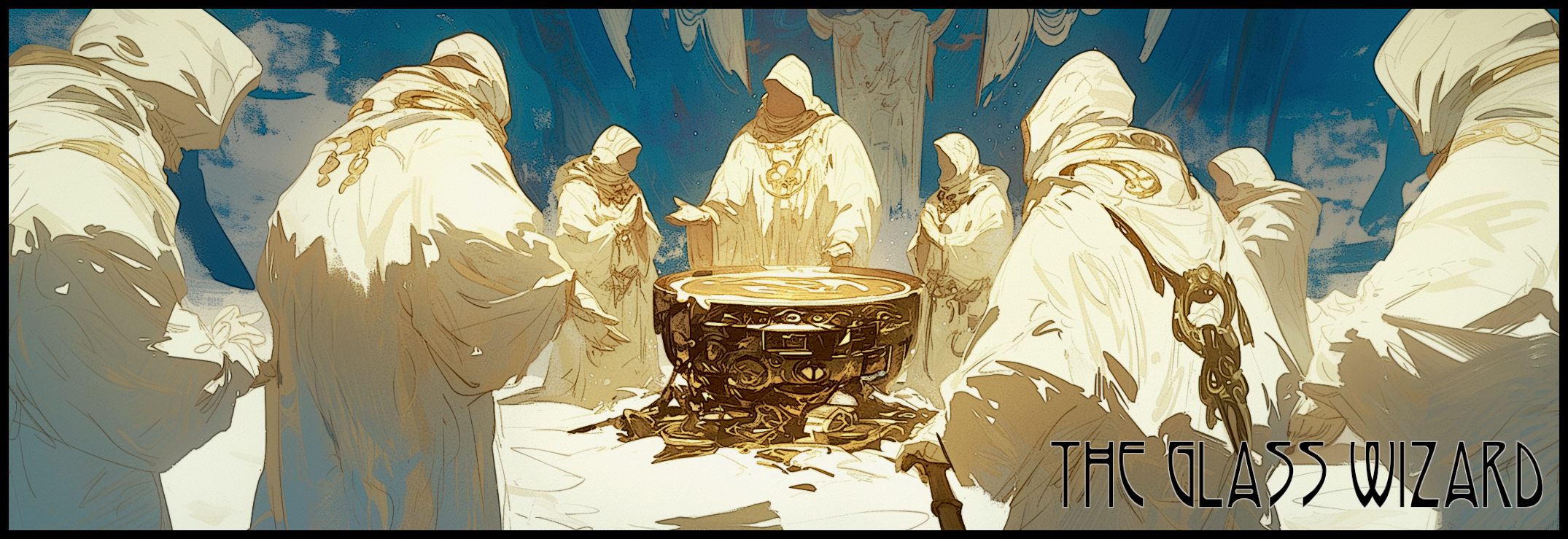“Midnight now believed that the defining characteristic of Gods was a different nature. They were not predators, or trappers, or prey. No, they had a unique nature — it was inherent in them to impact other beings. Gods did not act to be acknowledged by lesser beings: they were the ones who sought and acknowledged lesser beings, as the dawnings had done with Midnight. Gods existed to make lesser beings more.“ [B1.C10]
The story has not yet introduced individual Gods.
Likewise, the history of the creation of the world has not been revealed.
As the story progresses, secrets about the Gods will be added.
TRIVIA
Primordial Terror
"What he sought was that oldest of instincts, the core impulse of consciousness; not safety, not even survival, but the sense of self. He could not be alone. Because alone he could not be." [B1.C18]
In [B1.C18], Yu is overwhelmed by the Vourae Queen's voice. Her presence is so vast that she may well be a God to him. He experiences the greatest of primordial terrors; the fear of being alone.
"Survival presents many faces. All beings carry instincts to hunt or to fight, to flee and to hide, or to freeze when all other is denied. All who live are shaped by these patterns, and follow them to varying degrees. Some learn, through strength of mind and discipline of body, to resist. Others exist only through their expression.
Beneath these instincts lies something else. Go further back than that part of the mind that marks a singular consciousness as an individual, and further than the reflexes imprinted upon such an existence at birth, and further still than the marrow-deep changes that, for generations, shaped what would become the habits of a species, and you will find more. There is a layer beyond lineage. Beneath the generational shaping of flesh and mind that is instinct, there lies something deeper still. Another stratum, far older, far darker: an inheritance shared by all beings.
Every singular existence, however distinct, however different it may be from all others around it, and from all that were before and will be after, carries this one same core within its essence. It is the residue of first creation, the scar left at the first terror, when lesser beings faced not merely something greater, but what is absolute.
Everything that lives carries this primordial echo. Against danger, some may fight and some may flee. In the face of death, some may hide and some may plea. But in the presence of a God, all instincts resolve into one. When one existence is so vast that it leaves no room for another, when the self is driven into nothingness, when we are reduced to a fading voice, when we feel ourselves diminished into darkness and suffocated into silence, then the need is no longer survival. It is no longer resistance. It is recognition. We need to feel that there is still something to us. If we can no longer feel ourselves, we need to be felt through another. We need to be acknowledged in our unmaking. We need to feel that we are not alone. [B1.C18]
GENESTERS
Amongst those who know and see much, such as Faroah, these entities are attributed with creating life.
Faroah's revellation about the Genesters of Life
In [B1.C12], Faroah reveals to Samasira:
"The passing of time is the result of the flow of energies between the two Genesters of Life. T̵̩̅̑̿e̷̡̖̤̣̦͉̹̪̿̔ͪ̍͜͜͠͝_̸̵̰̦̗̒͜h̡͔͒̄̇̓ḁ̶̦̤̤̥̤ͯ͊͂͗͌͜͠ṟ̸͓̞͙̜̹̂͐̉̎͆͂͢͝u̯̼ͫ̆͐͘nͮ gives to the world while OϻΔΓΔΠ [Omaran] takes from the world. This exchange creates change, and change is the essence of time.
But time birthed imbalance, where OϻΔΓΔΠ ascended and T̵̩̅̑̿e̷̡̖̤̣̦͉̹̪̿̔ͪ̍͜͜͠͝_̸̵̰̦̗̒͜h̡͔͒̄̇̓ḁ̶̦̤̤̥̤ͯ͊͂͗͌͜͠ṟ̸͓̞͙̜̹̂͐̉̎͆͂͢͝u̯̼ͫ̆͐͘nͮ waned, until guardians of the world arose to restore equilibrium. Upon these keepers of balance, T̵̩̅̑̿e̷̡̖̤̣̦͉̹̪̿̔ͪ̍͜͜͠͝_̸̵̰̦̗̒͜h̡͔͒̄̇̓ḁ̶̦̤̤̥̤ͯ͊͂͗͌͜͠ṟ̸͓̞͙̜̹̂͐̉̎͆͂͢͝u̯̼ͫ̆͐͘nͮ bestowed three hearts: one to live, one to thrive, and one to give.
These guardians learned to give back to the giver. Some, however, fell victim to OϻΔΓΔΠ’s corruption. From these, OϻΔΓΔΠ took the heart to give and replaced it instead with a fragment of his essence. From that moment forth, all they take from the world, he consumes."
OϻΔΓΔΠ [Omaran]
As the story progresses, revelations about OϻΔΓΔΠ will be added.
T̰́̇ͦ̀è̸̷̸̬̤̗̊_̸̵̰̦̗̒͜ȟ̗̍ͤa̶͉͉͍̭̰̅̀̈͜ͅȓ̶̶̛̦͇͙̟̈̿͒ͮ͑̋̚͡u̟͖͔̖̙͙͆̄̿ͩͧ̃̽̓̈̌̀͟͞n [Teharun]
As the story progresses, truths about T̵̩̅̑̿e̷̡̖̤̣̦͉̹̪̿̔ͪ̍͜͜͠͝_̸̵̰̦̗̒͜h̡͔͒̄̇̓ḁ̶̦̤̤̥̤ͯ͊͂͗͌͜͠ṟ̸͓̞͙̜̹̂͐̉̎͆͂͢͝u̯̼ͫ̆͐͘nͮ will be added.
MYTHOLOGICAL GODS
Every now and then, the first names of individual gods are mentioned. The gods listed here appear in rumours, myths and legends. At this point in the story, their existence has not yet been confirmed.
Diamos — Goddess of the Fina
Though Diamos had been mentioned by Tria in [B1.C14], nothing else had yet been revealed about this goddess.
First mentioned: [B1.C14]
𝞨𝟁𝞬 [Myr] — Goddess of the Night
𝞨𝟁𝞬, the cosmic artisan, is said to be the mythological mother of Lightshifters and midnight stalkers. In these tales, midnight stalkers are destined to roam the world and capture moonlight to create the darkest and most magic-infused of nights.
She paints the stars with her effulgent palette of starlight.
Amongst scholars, she is commonly diminished as a mere storybook deity [B1.C9].
First mentioned: [B1.C8]
Seyfara — Goddess of the Moon
She is rumoured to have bestowed midnight stalkers with their unique abilities to merge with the shadows.
First mentioned: [B1.C8]
PERCEIVED AS GODS
These entities have not been confirmed as known gods throughout the story. However, they are regarded as such by individuals or individual groups.
Dawnings — Gods amongst the Darkness
Midnight encounters Dawnings in the depths of the Albweiss Mountains [B1.C10]. Fist, she believes they came to imprint the rules of Darkness upon her. However, after they take from her essence and infuse something of theirs into her, she reasons that they must be Gods.
She perceived them as fluid, amorphous forms with shifting visages, elongated limbs and cold feelers that emerged from Darkness.
Midnight had known their name and she had understood that they were the living contrast of shadows, even though she had never heard of them before. Their existence had been embedded within hers, awakened upon touched. She perceived them as an overwhelmingly strong entities sharing one consciousness that had conveyed a complex and contrasting amalgamation of indifference, amusement and desire.
"With this new piece of essence she had received, with the newfound, pulsating hunger coursing through her veins, Midnight now believed that the defining characteristic of Gods was a different nature. They were not predators, or trappers, or prey. No, they had a unique nature — it was inherent in them to impact other beings. Gods did not act to be acknowledged by lesser beings: they were the ones who sought and acknowledged lesser beings, as the dawnings had done with Midnight. Gods existed to make lesser beings more." [B1.C10]
First mentioned: [B1.C10] Encountered by Midnight within the Albweiss Mountains.
The Albweiss — The Divine Mountain
"The mountain’s will was vast and sacred — it demanded belief, not comprehension." [Nagrak in B1.C14]
For the Haraak, the Albweiss carries divine will. They see themselves as the guardinas of the mountains. Nagrak in particular believes himself toched by the ![]() to make the sacred will of the mountain reality [B1.C14].
to make the sacred will of the mountain reality [B1.C14].
SELF-PROCLAIMED GODS
These individuals claim to be Gods.
As the story progresses, such characters will be listed here.

